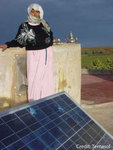TEMASOL: Providing Energy Access to Remote Rural Households in Morocco
In Morocco, despite the government’s efforts to expand its grid-based coverage, about 9% of the rural population could not be cost-effectively connected. Given that Morocco enjoys 3,000 hours of sun per year, solar energy was therefore thought to be a cost-effective alternative. TEMASOL is a joint-venture between the oil and electricity French companies TOTAL and EDF created in 2002 within the framework of a national program championed by Morocco’s National Electricity Office aiming at electrifying rural regions of the country through renewable sources of energy.
TEMASOL’s activities cover the supply, installation, operation and maintenance of photovoltaic kits. The main actors behind this business model are the National Electricity Office and the local communes and Caïds, as well as foreign partners, such as German Development Bank KfW and the French Fund for the World Environment, which provided technical assistance and funding at the inception of the project. As a result of TEMASOL’s activity, 106,200 customers enjoyed access to electricity between 2002 and 2008, which also contributed to women empowerment, increased school attendance and local economic spin-offs. In 2009, TEMASOL employed 84 people, mostly from low-income communities. On the environmental side, this program allows for a saving of 32,000 tons of CO2 over 10 years compared with traditional energy uses. TEMASOL registered increasing profits since 2004, up to USD 419K in 2008.


